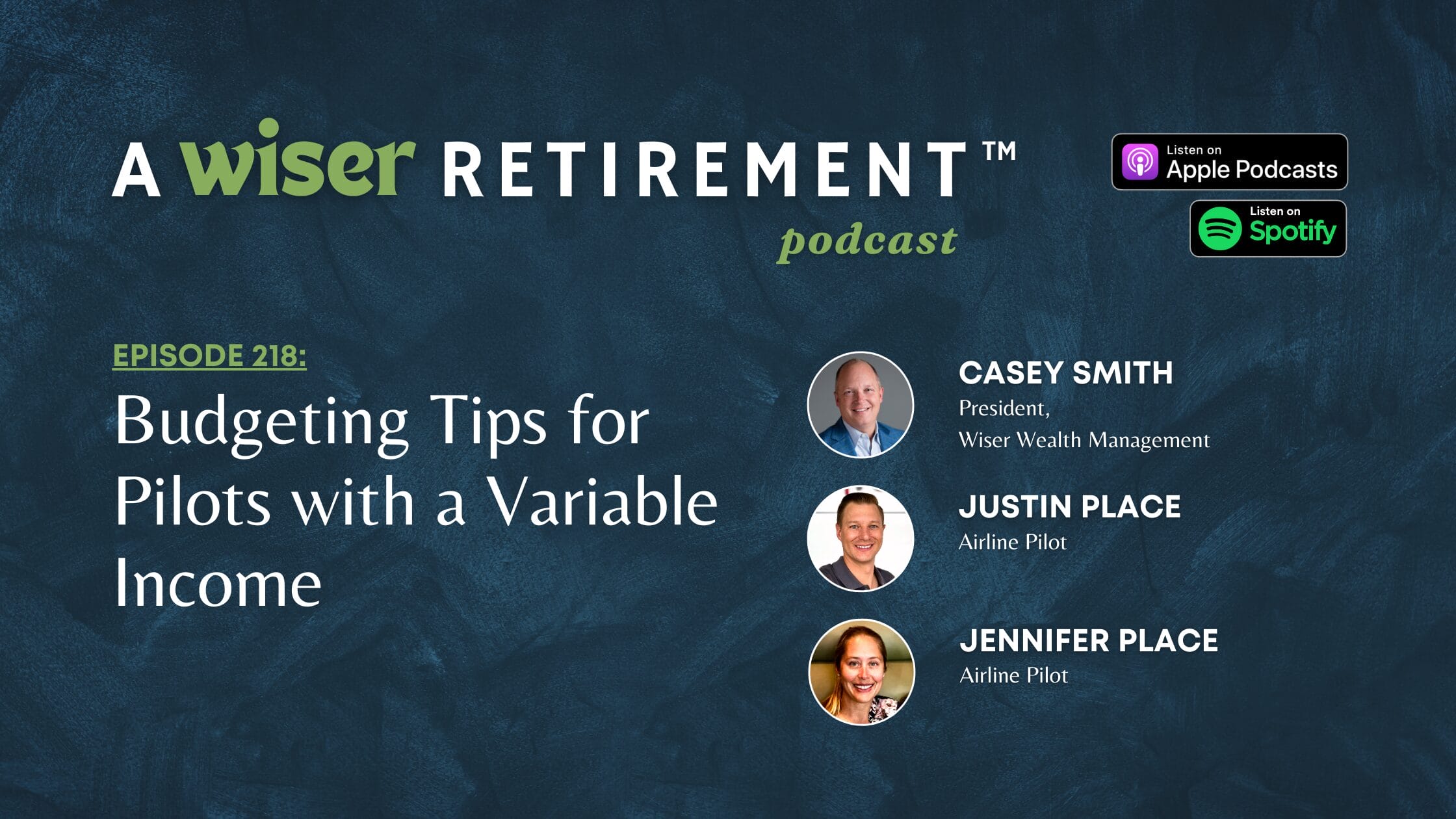
Budgeting Tips for Pilots with a Variable Income
On this episode of A Wiser Retirement™, Casey Smith is joined by guests, Justin and Jennifer Place. Justin and Jennifer are both pilots at a major airline. They discuss what it was like starting at regional airlines and how to make it to the majors, different career paths for pilots, variable income budgeting tips, emergency funds, airline 401k plans, and planning for retirement.
Listen or Watch:
Summary
Starting Your Career in Aviation
There are different paths young people interested in aviation can take today. There are programs at the University of North Dakota, University of Florida, or Embry-Riddle Aeronautical University for those coming out of high school. It is important to choose a school that will set you up for success in you career as a pilot. You should also consider trying to get a job at an airline with strong financial stability, like Delta, and use regional carriers as a backup. The aviation industry has changed significantly over time, with pilots now basing their career choices on where they want to live rather than just which airline to work for.
Why Emergency Funds are Different for Pilots
Pilots emergency funds require more than the typical 3-6 months that most people set aside. Pilots should have around two years worth of living expenses in their emergency fund. It can be difficult as a pilot to find a new job if you loose your current one, so having an adequate emergency fund in place will help you be prepared.
7 Budgeting Tips if You Have a Variable Income
It can be tricky to budget when you have an unpredictable income as a pilot. It’s important to make sure you’re on the same page with your spouse regarding finances and that you set clear goals together. Quicken is a popular tool to manage and monitor expenses effectively. Here are 7 helpful tips for budgeting with a variable income:
- Cover your minimum monthly expenses first.
- Budget using your average monthly income.
- Budget using your lowest monthly income.
- Set up an account to pay yourself.
- Build your emergency fund.
- Plan ahead for peaks and valleys.
- Set priorities for your investments.
Links:
- Click here to download your airline’s 401k allocation for free.
Connect:
- Click here to schedule a consultation with one of our financial advisors.
- Follow us on social media: Twitter, Instagram, Facebook, LinkedIn, and YouTube.
- Learn more about A Wiser Retirement™ podcast and access previous episodes.
Share This Story, Choose Your Platform!
Wiser Wealth Management, Inc (“Wiser Wealth”) is a registered investment adviser with the U.S. Securities and Exchange Commission (SEC). As a registered investment adviser, Wiser Wealth and its employees are subject to various rules, filings, and requirements. You can visit the SEC’s website here to obtain further information on our firm or investment adviser’s registration.
Wiser Wealth’s website provides general information regarding our business along with access to additional investment related information, various financial calculators, and external / third party links. Material presented on this website is believed to be from reliable sources and is meant for informational purposes only. Wiser Wealth does not endorse or accept responsibility for the content of any third-party website and is not affiliated with any third-party website or social media page. Wiser Wealth does not expressly or implicitly adopt or endorse any of the expressions, opinions or content posted by third party websites or on social media pages. While Wiser Wealth uses reasonable efforts to obtain information from sources it believes to be reliable, we make no representation that the information or opinions contained in our publications are accurate, reliable, or complete.
To the extent that you utilize any financial calculators or links in our website, you acknowledge and understand that the information provided to you should not be construed as personal investment advice from Wiser Wealth or any of its investment professionals. Advice provided by Wiser Wealth is given only within the context of our contractual agreement with the client. Wiser Wealth does not offer legal, accounting or tax advice. Consult your own attorney, accountant, and other professionals for these services.





